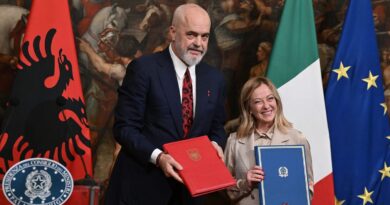Macron keeps Borne as PM amid stalled second term
Press play to listen to this article
Voiced by artificial intelligence.
PARIS — French President Emmanuel Macron will stick with Elisabeth Borne as his prime minister, ending speculation that he would seek a wider reset after recent unrest.
The president decided to maintain Borne in the position because “calm had returned” to France and the Bastille Day celebrations were “a success” despite fears that they would be marred by clashes, according to his staff.
After her appointment in May 2022, Borne steered the government through several crises — including weeks of violent demonstrations this spring over Macron’s plans to raise the legal age of retirement to 64 from 62. Last month, the fatal shooting of a young man of North African descent during a police intervention sparked days of riots and chaos in poorer French suburbs.
“Borne is a good compromise for Macron. She is doing the job better than expected. He’ll probably change her only after the next elections if the result is very bad for [Macron’s] Renaissance party,” said Bruno Jeanbart, a pollster for OpinionWay, referring to European elections next year.
A minor reshuffle of Borne’s government is, however, expected later this week, with speculation swirling that the most embattled ministers — including Junior Minister of Citizenship Marlene Schiappa and Education Minister Pap Ndiaye — are on the way out.
Macron’s decision to aim for continuity and stability instead of seeking a bolder reset has drawn criticism from political opponents, who slammed the move as uninspired and weak.
“Macron maintains Borne […] Nobody else wants to get on board a boat that is sinking. The Macron world is shrinking,” tweeted hard-left member of parliament Mathilde Panot. Far-right leader Marine Le Pen wrote that the decision to keep Borne condemns the country to “powerlessness and immobility.”
But even Macron’s supporters have been critical of his decision to maintain his prime minister but not renew his confidence in her with a public address. “[The Elysée] confirmed her position during an off-the-record briefing with the press, it’s embarrassing,” a government advisor told Paris Playbook.
No pain, no gain
Expectations had been mounting that Macron would swap his prime minister after he announced in April that he was giving Borne and her cabinet 100 days to appease the country and launch reforms after the pensions fiasco. Gerald Darmanin, France’s interior minister and a former member of the conservative Les Républicains party, was floated as a possible replacement.
Instead, Macron probably decided that promoting a minister or a politician from inside the majority would not bring any political gain, according to the pollster Jeanbart. “Macron’s only real option was to give the premiership to Les Républicains, form a coalition with them and get a majority in parliament,” he said.
Last year, the French president lost a majority in parliament, and has relied on unstable, ad-hoc agreements with conservatives to push through legislation. But he was unable to seal a deal with them on pensions, and was forced to use an unpopular parliamentary maneuver to pass his flagship legislation without a vote. He subsequently postponed plans to bring forward an immigration bill amid chatter that he was becoming a lame-duck president.
“Macron doesn’t want to share power with [the conservatives] in his second term […] And they would only have accepted a deal if it included the premiership,” Jeanbart added.
The French president is expected to announce his priorities this week for the soon-to-be-reshuffled cabinet.
Elisa Bertholomey contributed reporting.




